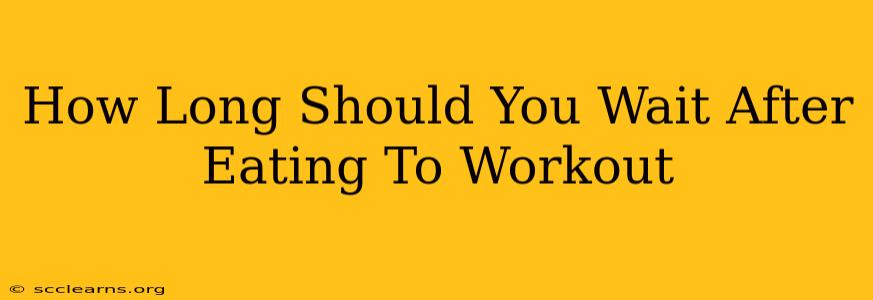Working out after a meal is a common question among fitness enthusiasts. Finding the right balance between fueling your body and avoiding discomfort during exercise is key for optimal performance and recovery. This guide will explore the ideal waiting time and the factors influencing it.
The Importance of Timing
The timing of your workout relative to your meal significantly impacts your performance and digestion. Eating too close to a workout can lead to digestive upset, including cramps, nausea, and sluggishness. On the other hand, exercising on an empty stomach can leave you feeling weak and lacking energy.
Factors Affecting Waiting Time
Several factors determine how long you should wait before exercising after a meal:
-
Meal Size and Composition: A large, high-fat meal requires a longer waiting period than a small, light snack. Fatty foods take longer to digest, and consuming them before a workout can cause digestive distress. Smaller, easily digestible meals like fruits or a small protein shake are preferable for pre-workout nutrition.
-
Intensity of Workout: High-intensity workouts demand more energy and require a different approach than low-intensity exercises. For intense activities, you might benefit from a slightly larger pre-workout snack, but still allowing sufficient digestion time. Low-intensity workouts may allow for a shorter waiting period, especially after a light snack.
-
Individual Sensitivity: Everyone digests food at a different rate. Pay attention to your body's signals. If you experience discomfort after eating before exercising, increase the waiting time.
-
Type of Exercise: Certain types of exercises might be more sensitive to food intake. For instance, running or high-impact activities could be more prone to digestive issues if you’ve recently eaten compared to strength training.
Recommended Waiting Times
While there isn't a universally perfect time, here are some general guidelines:
- Light Snack (fruit, yogurt): 30-60 minutes
- Small Meal (sandwich, salad): 1.5-2 hours
- Large Meal (heavy dinner): 3-4 hours or more
Important Note: These are just guidelines. Listen to your body! If you feel uncomfortable, stop and rest.
What to Eat Before a Workout
Choosing the right foods before a workout is just as important as timing. Opt for easily digestible foods that provide sustained energy without causing digestive upset. Good options include:
- Bananas: Provide quick energy and potassium.
- Oatmeal: Offers complex carbohydrates for sustained energy release.
- Yogurt: Contains protein and carbohydrates for balanced energy.
- Energy bars (check ingredient list): Choose bars with minimal added sugar and healthy fats.
- Protein shake: Quick source of protein to support muscle recovery.
When to Workout on an Empty Stomach?
Working out on an empty stomach can be beneficial for some, particularly if your goal is fat burning. Your body might utilize stored fat for fuel more efficiently in a fasted state. However, it is crucial to consider the intensity of your workout. High-intensity exercise on an empty stomach may lead to fatigue and decreased performance.
Conclusion
Finding the optimal time to workout after eating depends on individual factors, meal size, and workout intensity. Prioritizing listening to your body and choosing the right pre-workout fuel will help you maximize your performance and avoid digestive discomfort. Remember, consistency and attention to your body's needs are key to successful fitness endeavors.

